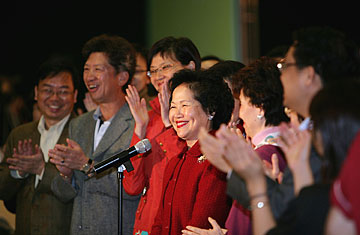
Anson Chan celebrates after winning Hong Kong's December 2 by-election
It has been a tumultuous autumn for Hong Kong's democrats. In local elections two weeks ago, the democrats — who support universal suffrage for the quasi-autonomous Chinese territory — were soundly thrashed by parties loyal to Beijing, winning only 59 district council seats versus 115 for the most prominent pro-Beijing party. That result — along with a historically low voter turnout — seemed to suggest that the democrats had become a spent force in Hong Kong politics after cresting in popularity amid mass anti-government protest rallies in 2003.
But the reformers may have arrested their slide into irrelevance with yesterday's victory by Anson Chan, a widely known ex-civil servant who has refashioned herself as a champion of universal suffrage. According to returns reported Monday, Chan won about 55% of the vote in a by-election to replace Ma Lik, a prominent pro-Beijing legislator who died in August.
Chan, who beat another well-known former government official, Regina Ip, framed her victory as a mandate for democratic reform. "The results of this election indicate that Hong Kong people are anxious to push forward on democracy," Chan said in her acceptance speech.
But things may not be that clear-cut. Voter turnout — around 52%, the highest since 2004 — may have been inflated by the stature of the candidates, according to Ma Ngok, a political scientist at the Chinese University of Hong Kong. Chan, a chief secretary in the last British colonial administration, remains very popular six years after retiring from government. Meanwhile, Ip is still controversial for aggressively pushing anti-sedition legislation during her tenure as Hong Kong's Secretary for Security. Although Ip also positioned herself as pro-suffrage — she says she simply wishes to avoid a confrontation with Beijing over the issue — her past support of mainland-backed policies dogged her during the campaign. Hong Kong voters may not prefer Chan's agenda to Ip's as much as they prefer Chan herself.
Despite her charisma, Chan's influence will be limited as one of 60 members of Hong Kong's Legislative Council. She will hold the seat for only seven months, when a new crop of legislators will be voted in. According to Ma, Chan's ability to quickly translate her popularity into momentum for reform will determine whether yesterday's victory for democrats was merely symbolic.
"All eyes are on her to deliver," Ma says. "Now that she has a kind of mandate, she carries a lot of expectation into office. I think she will be under some pressure to get something done because it seems the democrats haven't been able to do much to move the system forward."
